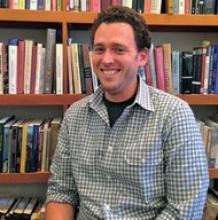What Is It
If we couldn't trust each other, our lives would be very different. We trust strangers not to harm us, we trust our friends to take care of our most prized possessions, we even trust politicians (sometimes) to come through on their campaign promises. But trust may also come at a high cost: it can leave us vulnerable to lies, deception, and blackmail. So is it reasonable for us to be so trusting? And how should we treat those who trust us? John and Ken put their trust in Stanford philosopher Jorah Dannenberg, in a program recorded live at the Marsh Theater in San Francisco.
Listening Notes
John finds the concept of trust to be lame. He refers to it as practically a synonym for stupid, helpless, or both. Ken argues that trust is much more important than John credits it to be. Families, societies…every complex human institution is built on trust! The capacity to trust distinguishes us from other animals. John speaks about the logic of trust, where the trustor trusts the trustee to do an action; he brings up the idea of “trust but verify,” and in all cases, the trustor should find a guarantee that the trustee will do the action they are entrusting them to do. Ken acknowledges this notion of verification. John says that it is an ironic way of saying “don’t trust, verify instead.” To trust someone is to rely on them without having any guarantees. But if you do that, you must be weak and have no choice, or else you must be stupid. John explains that we are forced to count on others all the time, and this is a weakness. The newborn has no choice to trust its mother to provide food. Ken argues that trust is not an expectation without guarantees. It has a certain guarantee, just like when someone makes a promise. The trustor relies on the trustee to be true to their words. So trust is a certain way of counting on an outcome. So is trust a pattern of reliance, wonders John? They consider this question.
John and Ken welcome guest Jorah Dannenberg, Assistant Professor of Philosophy at Stanford University and author of “Promising Ourselves, Promising Others.” John takes his best guess as to why Jorah decided to study trust; Jorah explains that he grew up in a big city where trust was not obviously present – the kind of town where people don’t leave their doors open. On the other hand, his grandfather lived in a small community where citizens had to live on the strength of a word and a handshake. That got Jorah thinking: why does promising and trusting matter so much? John asks Jorah: what kind of guarantee do people like his grandfather have? Isn’t trust irrational to expect someone to do something without any kind of guarantee? Jorah explains that with trust, there is no guarantee of a single kind, but a person’s reputation and trustworthiness, especially in a small community, can really matter and provide a guarantee of sorts. It is not irrational to trust others – in fact, we need to be able to put our trust on others. But that doesn’t make it rational, says Ken. Jorah agrees, adding that we want to be rational in trusting. Still, the idea that we could get by without any trust at all is impossible. He imagines such impossibility in terms of a life in which we couldn’t trust anyone.
Ken says that trusting a person is the same as relying on them. But that theory seems flawed. Jorah explains that you can rely on a person without trusting them. You can rely on their predictable habits, on their predictable behavior. But trust is something that can be betrayed. We rely on things, on people, on corporations, such that they are predictable to some extent, but if they malfunction, we do not say we have been betrayed. Trust, in a way, entails relying on a person’s will and character. John asks: what did that trust amount to for Jorah’s grandfather and his community? Isn’t trust just a special form of prediction, that maybe x person do what he says because otherwise the cost would be unbearable? It seems not a matter of intrinsic trustworthiness but rather of fear. Jorah says that this would be reliance, and he distinguishes reliance from trust. Jorah, John, and Ken welcome questions from the audience, and they continue the discussion.
- Roving Philosophical Report (Seek to 5:17): Caitlin Esch talks with Professor Christina Bicchieri from the University of Pennsylvania, who studies game theory and norms to see how people trust and how they deceive. Are we able to detect who is lying to us?
- 60-Second Philosopher (Seek to 48:50): We entrust Ian Shoales with speeding through America’s trust issues as regards internal politics.



